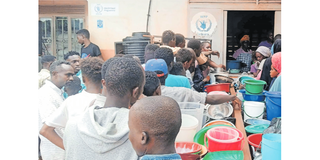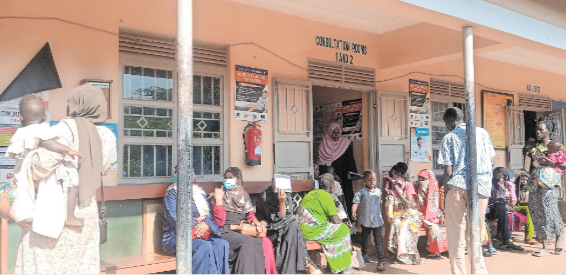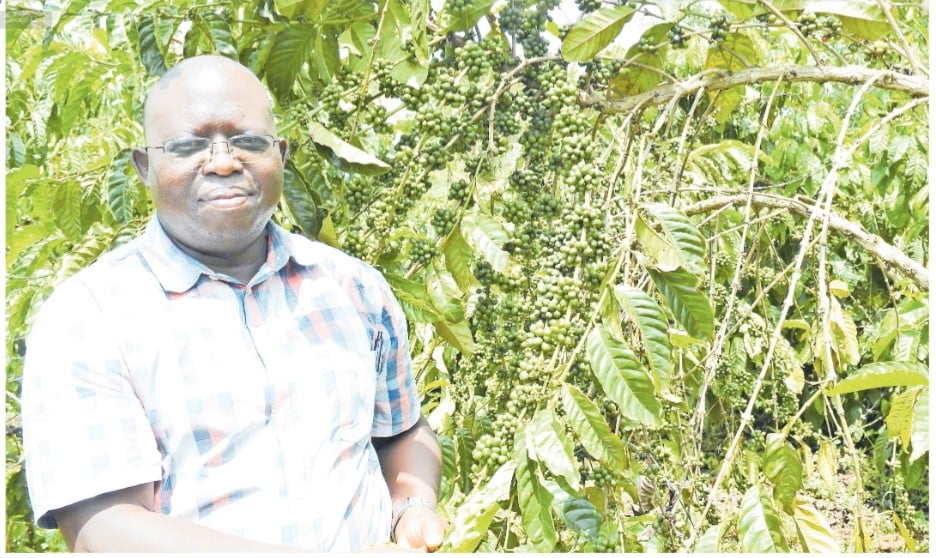
Refugees line up to receive food at Kiryandongo Reception Centre on September 17,
2024. The plight of refugees in Kiryandongo District is being worsened by limited funding.
PHOTO | BILL OKETCH
Gamat (not her real name) has a long story of pain. The 32-year-old woman escaped with her five children from violence in Sudan in April 2023.
Sadly, Gamat’s parents did not survive the war. “I was born in an Internally Displaced People (IDP) camp. My father was a community leader of the Masalit tribe in El-Geneina [in West Darfur],”she told this publication at the weekend.
On April 25, 2023, Gamat’s life changed forever when the fighting between rival armed factions broke out in Sudan. On this occasion, several women and girls were sexually abused, and Gamat’s father, mother, all her three brothers and grandmother were brutally killed.
“We fled to the border with Chad, but we found that it was already close and entry to that country was restricted. Since I was working as a nutritionist, I sold my gold and I hired a car to cross to South Sudan,” she narrates, adding that, “When I reached the border, I sold the clothes to feed my children and to raise money for transport to Juba.”
On July 7, 2023, she boarded a bus which was transporting refugees to northern Uganda’s Nyumanzi Transit Centre in Adjumani District.
On December 23 the same year, she was transferred to Kiryandongo Refugee Settlement. Today, she is among more than 120,000 refugees hosted in the government of Uganda’s designated camp for Sudanese refugees.
Gamat feels that while the sound of the gun could have gone silent, there is no end to their suffering.
“My children are not in school nor do they have good clothes to wear,” she says.
Despite living in the state of hopelessness, Gamat’s unbreakable spirit remains a shining example of resilience.
“I will not let my children grow in fear. I am a very strong woman, and I will die for them,” she says as tears roll down her cheeks.
But will Gamat’s sadness one day awaken the spirits of her ancestors to save her from the traumatic experience she goes through on a daily basis? Or will her family remain trapped in this cycle of suffering forever?
Sexual abuse
“One day, I went outside the camp to fetch water from a nearby tap and two men sexually abused me. This was the second time I was being raped here in the camp," she says.
“In May, my two daughters aged 13 and 11 were also sexually abused as I watched helplessly,” Gamat adds.
The case was reported to Panyadoli Hill Police Post. A top ranking police officer at Panyadoli Police Station confirmed the matter was under investigation.
“There are isolated cases of sexual violence against women and girls and child trafficking here, but when we receive such cases, we forward to Kiryandongo Central Police Station for proper management,” he says.
But Gamat accuses local leaders of not taking punitive action against the perpetrators.
“They are too slow in handling cases, we have lost trust in them,” she says.
Mr Cliff Winston Alvarico, the UNHCR head of field office in Kiryandongo, says: “Rape or sexual exploitation by some of the people in the host communities is something we were not aware of, but it is a high time we brought the matter to the table of investigation.”
Mr Bakri Al-Jack, the spokesperson for the Coordination of Civilian Democratic Forces (CCDF), recently visited Kiryandongo on a personal initiative, prompted by reports of deteriorating conditions and safety concerns.
“The refugees are unable to sustain themselves with the limited aid provided by the Refugee Affairs Office,” he told Sudan Tribune.
“The meagre rations of oil, corn, and salt are nowhere near enough to feed families for a month, forcing them to sell portions to afford necessities like medicine and clean water,” he adds.
The CCDF spokesperson highlighted alarming reports of harassment and abuse targeting female refugees, including underage girls, as well as conflicts between Sudanese students and other refugee groups in local schools.
In response to the crisis, he pledged to raise the concerns with the CCDF leadership and advocate for improved conditions in the
camp.
“The dire situation in Kiryandongo is not an isolated incident. Sudanese refugees across Uganda face similar challenges,” Mr Al-Jack says, highlighting the urgent need for increased humanitarian aid.
Rough journey
Dr Hamid Abdel, a Sudanese refugee, says the conflict has turned his home country upside down.
“Can you imagine the rate of suffering that I endured from Sudan up to here? I spent about two months on the journey and I came across a lot of obstacles. The journey is surrounded by danger: sounds of the gun and lack of services. Sometimes we come on foot, sometimes we come on donkeys,” he says.
“Psychologically, we are completely destroyed, we are worthless, sorrowful and sad. How can you imagine your house is destroyed? How can you imagine that you have lost one of your family members such as your mother? This image cannot be dropped from us.”
Mr Emmanuel Turyagyenda, the Kiryandongo settlement commandant or refugee desk officer at the Office of the Prime Minister, acknowledges that refugees face numerous challenges.
“When you come to my own home that means you have left your own home. So, what I am surviving on is what you have to share with me. However, with reference to new arrivals (Sudanese), I am reliably informed they had far better standards of basic education and comprehensive medical services,” he says.
Kiryandongo receives, registers and relocates on average more than 1,000 new arrivals weekly. As of August 31, there were 124,790 refugees and asylum seekers in Kiryandongo [Source: Office of the Prime Minister/ UNHCR].
Refugee funding
Mr Bruno Rotival, the European Union Humanitarian Aid Uganda Head, said the humanitarian office of the European Commission (ECHO) has a partnership with UNHCR and other partners to provide humanitarian assistance to refugees.
“We are doing everything possible for this assistance to be channeled through national partners to the very maximum because we believe this assistance is something that is necessary,” he told journalists in Kiryandongo on September 18.
He added: “Over the past years, we allocated around 30 million Euros per year to the humanitarian situation in the settlement to provide assistance to the refugees that have been here at least for a while as well as to secure assistance to the many refugees that are coming on a daily basis to Uganda.







